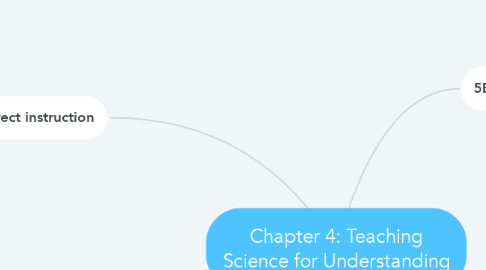
1. Direct instruction
1.1. learning from being told
1.2. teacher stimulus, student response, teacher response to student
1.3. anticipatory set, objectives, purpose, instructional input, modeling, monitoring for understanding, independent and guided practice
1.4. Appropriate for subjects which you can't explore in a concrete way, and content that you don't want students to explore through trial and error
2. Textbook Instruction
2.1. main materials: textbook and worksheet
2.2. supplemental material: teacher lecture
2.3. demands on reading, language and memory skills
2.4. work as a supplement with hands on instruction
3. 5E Model of Inquiry Instruction
3.1. Engage
3.1.1. Ask questions about objects, organisms and events, peak curiosity and provide focus, inquiry question created, teachers assess prior knowledge
3.2. Explore
3.2.1. Plan and conduct simple investigations, gather data
3.2.1.1. "I noticed, I wonder" chart
3.3. Explain
3.3.1. Use data and scientific knowledge to generate explanations, reflection, most teacher directed part of process (possibly introduce scientific explanation)
3.4. Elaborate
3.4.1. Apply knowledge and skills in new situations, extend strategies, concepts, principles and explanations to new problems, use developing knowledge to negotiate new task
3.5. Evaluate
3.5.1. Demonstrate knowledge understanding through formal and informal assessments, communicate, investigations, data and explanations to others, make decisions based on data, self assessment

